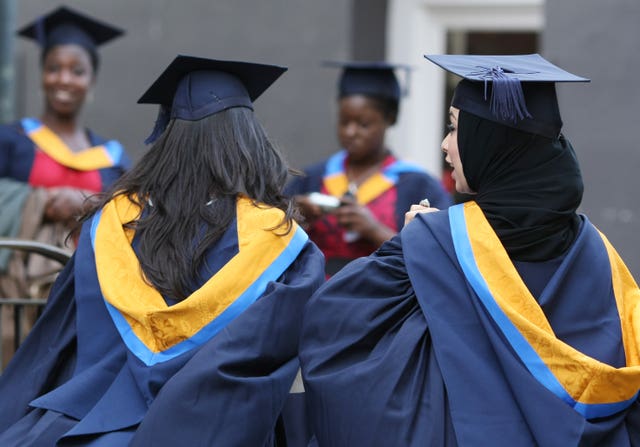
Students from black and ethnic minorities must be made to feel like they belong and are part of their university community to help boost achievement, the University of Leicester’s new vice-chancellor has said.
Any institution which is serious about raising the achievement of black and minority ethnic (BAME) students should look at what they can do to improve issues such as the diversity of its workforce, according to Professor Nishan Canagarajah.
In an interview with the PA news agency, Prof Canagarajah, who has taken up his post as Leicester’s first BAME vice-chancellor, said universities could also look at areas such as assessment and non-academic opportunities for undergraduates.
Figures published in a Universities UK report earlier this year show that in 2017/18, there was a 13% attainment gap between the likelihood of white students and those from BAME backgrounds getting a first or 2.1 degree.
🚨 New report
Universities UK and @nusuk believe UK universities must commit to ending the BAME student attainment gap
Five steps have been identified for universities to improve BAME student outcomes
Find out what they are 👉 https://t.co/h4U8lofjIu#ClosingtheGap pic.twitter.com/IGyBQr5Hgd
— Universities UK (@UniversitiesUK) May 2, 2019
At the University of Leicester, where over half (52%) of students come from a BAME background, this gap is 10%. Prof Canagarajah, an engineer originally from Sri Lanka, has pledged to eliminate this difference – which he calls an “awarding gap” – by 2025, saying it is “one of the most pressing priorities both for me, the university and the sector”.
“That includes the way we talk about the awarding gap, as opposed to the BAME attainment gap, which shifts the onus on change from student to institution,” he says.
Institutions could look at what the issues are that contribute to various groups of students having different experiences of higher education, Prof Canagarajah argues.
He adds: “In my view there is a strong correlation between the students feeling a sense of belonging and included in the community and their achievements.”
He goes on to say that there is a need to make sure “our university communities are diverse and inclusive for students from all kinds of backgrounds”.
“In this case we are talking about BAME,” Prof Canagarajah says, “but I would also add it relates to social backgrounds as well, so for white students coming from widening participation they also need to feel they belong to that institution.”
A “fundamental issue” in higher education is under-representation of BAME within the workforce – not just among academics, but professional services students come into contact with, such as student wellbeing and finance, he says.
“This is a systemic issue that cannot be fixed overnight, but we need to act now, if that is one of the fundamental problems we need to fix for students from diverse backgrounds to feel they belong to that institution,” he told PA.
In addition, he said, while growing issues such as decolonising curriculums are important, students also need to feel they are not alone in their lectures and group work.
“For example, the student body themselves need to understand there are diverse students.
“In STEM subjects typically you will have laboratory activity where you are working in a smaller group, similarly in humanities you will work in seminar groups. If you feel you are the only one, kind of isolated, it’s very hard for you to contribute and realise your full potential.”

Similarly, assessment could be looked at to see if it in any way disadvantages certain groups, Prof Canagarajah said.
“A simple example I might give is that when you are working in groups, one form of assessment is peer assessment, and when you are in a group of say five or six, and you are the only ethnic minority, we don’t know if they feel anyway disadvantaged by that assessment.”
He adds: “It’s not simply the material they are taught, it’s how they contribute to that learning experience, how they achieve the outcomes that we want them to achieve in different settings.”
Finally, students who are given opportunities to do non-curricular activities, such as working within their institution, tend to do better in their degree programmes, Prof Canagarajah says, and more must be done to ensure that BAME students get this type of chance.
The University of Leicester has set up a number of initiatives to close the awarding gap, including an initiative to recruit more BAME staff and a curriculum project to embed equality, diversity and inclusion.
Prof Canagarajah says: “My vision is to enhance the experience of every student from every background at Leicester University by equipping them with all the necessary skills to be successful in whatever career they choose.”


Comments: Our rules
We want our comments to be a lively and valuable part of our community - a place where readers can debate and engage with the most important local issues. The ability to comment on our stories is a privilege, not a right, however, and that privilege may be withdrawn if it is abused or misused.
Please report any comments that break our rules.
Read the rules here